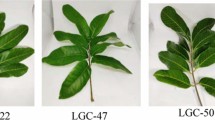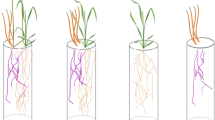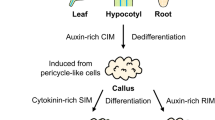Abstract
Banana is a crop that generally presents low genetic variability. Hence, in vitro culture is used to obtain pathogen-free micropropagated plants. The objectives of this study were to perform micropropagation using meristem explants from 13 promising banana clones collected at farmers' fields in the Argentinean Formosa province, characterize the regenerated and the explant's donor plants using amplified fragment length polymorphism (AFLP) profiles. evaluate the regenerated plants carrying molecular polymorphism and the non-regenerated plants by quantitative traits of agronomic value, and identify associations between the molecular and phenotypic variability. These objectives were motivated by the fact that regenerated individuals frequently exhibit somaclonal variation. Both univariate and multivariate analyses were used to assess the molecular and phenotypic data as well as their associations. Although only two different clones could be regenerated, the total number of micropropagated plants was high. These plants presented a wider range of molecular and phenotypic variability than the non-regenerated plants, and associations were found between molecular somaclonal variations and agronomic traits related to tolerance to black leaf streak, photosynthetic capacity and carbohydrate storage capacity.





Similar content being viewed by others
Data availability
Data will be share after request.
References
Abdellatif KF, Hegazy AE, Aboshama HM, Emara HA, El-Shahed AA (2012) Morphological and molecular characterization of somaclonal variations in tissue culture-derived banana plants. J Genet Eng Biotechnol 10(1):47–53. https://doi.org/10.1016/j.jgeb.2012.05.002
Agrawal A, Sanayaima R, Singh R, Tandon R, Verma S, Tyagi RK (2014) Phenotypic and molecular studies for genetic stability assessment of cryopreserved banana meristems derived from field and in vitro explant sources. In Vitro Cell Develop Biol Plant 50:345–356. https://doi.org/10.1007/s11627-014-9606-4
Bairu MW, Fennell CW, van Staden J (2006) The effect of plant growth regulators on somaclonal variation in Cavendish banana (Musa AAA cv ‘Zelig’). Sci Hortic 108(4):347–351. https://doi.org/10.1016/j.scienta.2006.01.039
Cabodevila VG, Picardi LA, Pratta GR (2017) A multivariate aproach to explore the genetic variability in the F2 segregating population of a tomato second cycle hybrid. Basic Appl Genet 28(1):7–18
Deepthi VP, Simon L, Narayanaswamy P (2007) Identification of elite somaclonal variants from tissue cultured grand Naine banana (Musa spp. AAA) types using RAPDs. Fruit Veg Cereal Sci Biotechnol J 1:116–120
Del Medico AP, Cabodevila VG, Vitelleschi MS, Pratta GR (2019) Multivariate estímate of heritability for quality traits in tomato by the multiple factor analysis. Pesq Agrop Brasileira 54:e00064. https://doi.org/10.1590/S1678-3921.pab2019.v54.00064
Del Medico AP, Cabodevila VG, Vitelleschi MS, Pratta GR (2020) Characterization of tomato (Solanum lycopersicum L.) generations according to three-way data analysis. Bragantia. https://doi.org/10.1590/1678-4499.20190047
Del Medico AP, Tenaglia G, Lavalle AL, Vitelleschi MS, Pratta GR (2021) Analysis of mixed data to select bananas clones (Musa spp.) to be included in a germplasm bank. J Basic Appl Genet 32(1):25–42
Ermini JL, Tenaglia GC, Pratta GR (2018) Molecular diversity in selected banana clones (Musa AAA “Cavendish”): adapted to the subtropical environment of Formosa Province (Argentina). Am J Plant Sci 9(12):2504–2513. https://doi.org/10.4236/ajps.2018.912181
Ermini JL, Tenaglia GC, Parisod C, Pratta GR (2021) Banana somaclonal variation assessed by amplified fragment length polymorphism profiles at early cycles of in vitro culture. Agriscientiia 38(2):143–148
Ermini JL, Tenaglia GC, Pratta GR (2016) Diversity, ancestry relationships and consensus among phenotype and genotype in banana (Musa acuminata) clones from Formosa (Argentina) farmers. Plant Cell Biotechnol Mol Biol 267–278
Fonsah EG, Adamu CA, Okole BN, Mullinix BG (2007) Field evaluation of Cavendish banana cultivars propagated either by suckers or by tissue culture, over six crop cycles in the tropics. Fruits 62(4):205–212. https://doi.org/10.1051/fruits:2007016
Hwang SC, Ko WH (2004) Cavendish banana cultivars resistant to Fusarium wilt acquired through somaclonal variation in Taiwan. Plant Dis 88(6):580–588
Mahuad SL, Pratta GR, Rodriguez GR, Zorzoli R, Picardi LA (2013) Preservation of Solanum pimpinellifolium genomic fragments in recombinant genotypes increased tomato fruit quality. J Genet 92:195–203
Moresco MF, Pozzi F, Pratta GR, Felitti SA (2021a) Genetic analysis of Panicum coloratum var. makarikariense caryopsis retention. Afr J Range Forage Sci 2021:1–8
Moresco MF, Sacido MB, Pratta GR, Felitti SA (2021b) Seed related traits in two cuktivars of the megathermic forage species Panicum coloratum var. makarikariense in a temperate environment. Cienc Agron 38:e014
Pratta G, Zorzoli R, Picardi LA (2000) Multivariate analysis as a tool for measuring the stability of morphometric traits in Lycopersicon plants from in vitro. Genet Mol Biol 23(2):470–483
Pratta NN, Quaglino M, Rodríguez GR, Zorzoli R, Pratta GR (2010) A multivariate approach to the proteomics of tomato fruit ripening. Genes Genom Genom 4:48–51
Pratta GR, Rodriguez GR, Zorzoli R, Valle EM, Picardi LA (2011) Molecular markers detect stable genomic regions underlying tomato fruit shelf life and weight. Crop Breed Appl Biotechnol 11:157–164
Qamar M, Qureshi ST, Khan IH, Raza S (2015) Optimization of in vitro multiplication for exotic banana (Musa spp.) in Pakistan. Afr J Biotechnol 14(24):1989–1995. https://doi.org/10.5897/AJB2015.14621
Sahijram L, Jaya RS, Rao M (2010) Molecular and genetic characterization of somaclonal variation in micropropagated bananas (Musa spp.). Genes Genom Genom 4:9–17
Shirani Bidabad S (2010) Study of genetic and phenotypic variability among somaclones induced by BAP and TDZ in micropropagated shoot tips of banana (Musa spp.) using RAPD markers. J Agric Sci 2(3):40–60
Youssef M, James A, Mayo-Mosqueda A, Ku-Cauich JR, Grijalva-Arango R, Escobedo-GM RM (2010) Influence of genotype and age of explant source on the capacity for somatic embryogenesis of two Cavendish banana cultivars (Musa acuminata Colla, AAA). Afr J Biotech 9(15):2216–2223
Yusnita Y, Danial E, Hapsoro D (2015) In vitro shoot regeneration of indonesian bananas (Musa spp.) cv. ambon kuning and raja bulu, plantlet acclimatizationand field performance. Agrivita 37(1):51–58. https://doi.org/10.17503/Agrivita-2015-37-1-p051-058
Acknowledgements
Authors express their gratitude to Verónica García and Sol Degreef for their technical assistance in in vitro experiments and to César Keim and Hernán Romero for their technical support in field experiments. They are also grateful to UNR for financial support 80020190300141UR (Selección de clones de banana por características vegetativas y de calidad de fruta adaptados a los agroecosistemas subtropicales de Argentina) granted to GRP by UNR 2020-2024.
Funding
The Funding was provided by Universidad Nacional de Rosario.
Author information
Authors and Affiliations
Contributions
JLES carried out in vitro and molecular experiments as part of his Doctoral Thesis, directed by GRP. GCT carried out field experiments as part of his Doctoral Thesis, directed by GRP. GRP conceptualized the research and provided the financial support. This manuscript was co-written by all authors.
Corresponding author
Ethics declarations
Conflict of interest
The authors have not disclosed any competing interests.
Ethical approval
In compliance with the principles set forth by COPE (Committee on Publication Ethics), authors guarantee the integrity of the scientific record.
Additional information
Publisher's Note
Springer Nature remains neutral with regard to jurisdictional claims in published maps and institutional affiliations.
Supplementary Information
Below is the link to the electronic supplementary material.
Rights and permissions
Springer Nature or its licensor (e.g. a society or other partner) holds exclusive rights to this article under a publishing agreement with the author(s) or other rightsholder(s); author self-archiving of the accepted manuscript version of this article is solely governed by the terms of such publishing agreement and applicable law.
About this article
Cite this article
Ermini Starna, J.L., Tenaglia, G.C. & Pratta, G.R. Micropropagation of banana genetic resources adapted to the Argentine environment and generation of new variability for agronomic traits through somaclonal variation. Genet Resour Crop Evol (2024). https://doi.org/10.1007/s10722-023-01840-0
Received:
Accepted:
Published:
DOI: https://doi.org/10.1007/s10722-023-01840-0




